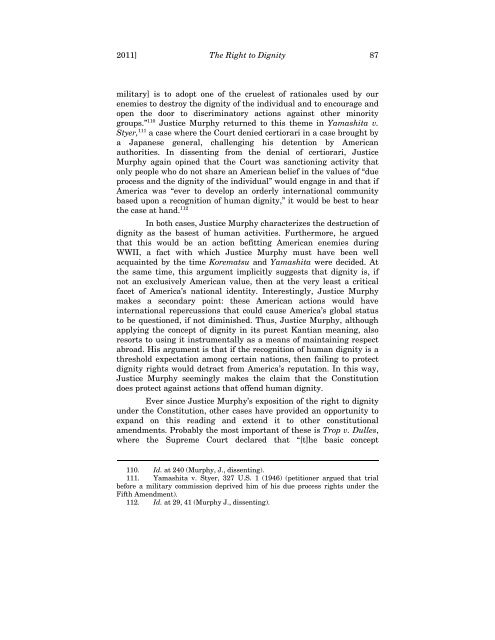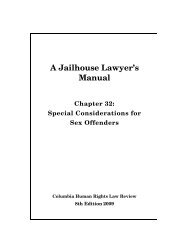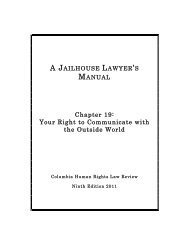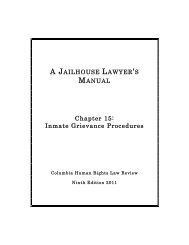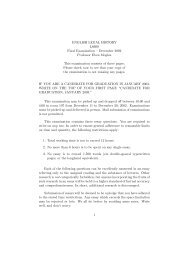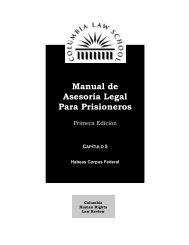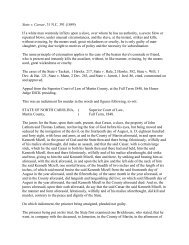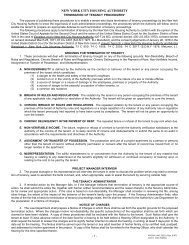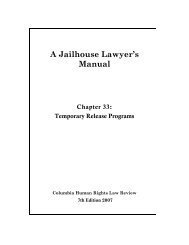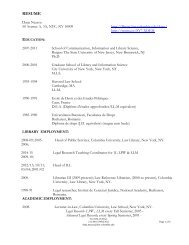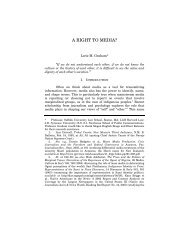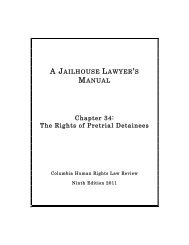The Right to Dignity Rex D. Glensy - Columbia Law School
The Right to Dignity Rex D. Glensy - Columbia Law School
The Right to Dignity Rex D. Glensy - Columbia Law School
Create successful ePaper yourself
Turn your PDF publications into a flip-book with our unique Google optimized e-Paper software.
2011] <strong>The</strong> <strong>Right</strong> <strong>to</strong> <strong>Dignity</strong> 87<br />
military] is <strong>to</strong> adopt one of the cruelest of rationales used by our<br />
enemies <strong>to</strong> destroy the dignity of the individual and <strong>to</strong> encourage and<br />
open the door <strong>to</strong> discrimina<strong>to</strong>ry actions against other minority<br />
groups.” 110 Justice Murphy returned <strong>to</strong> this theme in Yamashita v.<br />
Styer, 111 a case where the Court denied certiorari in a case brought by<br />
a Japanese general, challenging his detention by American<br />
authorities. In dissenting from the denial of certiorari, Justice<br />
Murphy again opined that the Court was sanctioning activity that<br />
only people who do not share an American belief in the values of “due<br />
process and the dignity of the individual” would engage in and that if<br />
America was “ever <strong>to</strong> develop an orderly international community<br />
based upon a recognition of human dignity,” it would be best <strong>to</strong> hear<br />
the case at hand. 112<br />
In both cases, Justice Murphy characterizes the destruction of<br />
dignity as the basest of human activities. Furthermore, he argued<br />
that this would be an action befitting American enemies during<br />
WWII, a fact with which Justice Murphy must have been well<br />
acquainted by the time Korematsu and Yamashita were decided. At<br />
the same time, this argument implicitly suggests that dignity is, if<br />
not an exclusively American value, then at the very least a critical<br />
facet of America’s national identity. Interestingly, Justice Murphy<br />
makes a secondary point: these American actions would have<br />
international repercussions that could cause America’s global status<br />
<strong>to</strong> be questioned, if not diminished. Thus, Justice Murphy, although<br />
applying the concept of dignity in its purest Kantian meaning, also<br />
resorts <strong>to</strong> using it instrumentally as a means of maintaining respect<br />
abroad. His argument is that if the recognition of human dignity is a<br />
threshold expectation among certain nations, then failing <strong>to</strong> protect<br />
dignity rights would detract from America’s reputation. In this way,<br />
Justice Murphy seemingly makes the claim that the Constitution<br />
does protect against actions that offend human dignity.<br />
Ever since Justice Murphy’s exposition of the right <strong>to</strong> dignity<br />
under the Constitution, other cases have provided an opportunity <strong>to</strong><br />
expand on this reading and extend it <strong>to</strong> other constitutional<br />
amendments. Probably the most important of these is Trop v. Dulles,<br />
where the Supreme Court declared that “[t]he basic concept<br />
110. Id. at 240 (Murphy, J., dissenting).<br />
111. Yamashita v. Styer, 327 U.S. 1 (1946) (petitioner argued that trial<br />
before a military commission deprived him of his due process rights under the<br />
Fifth Amendment).<br />
112. Id. at 29, 41 (Murphy J., dissenting).


